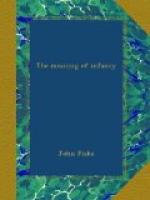With such creatures as the codfish, the turtle, or the fly-catcher, there is accordingly nothing that can properly be called infancy. With them the sphere of education is extremely limited. They get their education before they are born. In other words, heredity does everything for them, education nothing. The career of the individual is predetermined by the careers of his ancestors, and he can do almost nothing to vary it. The life of such creatures is conservatism cut and dried, and there is nothing progressive about them.
In what I just said I left an “almost.” There is a great deal of saving virtue in that little adverb. Doubtless even animals low in the scale possess some faint traces of educability; but they are so very slight that it takes geologic ages to produce an appreciable result. In all the innumerable wanderings, fights, upturnings and cataclysms of the earth’s stupendous career, each creature has been summoned under penalty of death to use what little wit he may have had, and the slightest trace of mental flexibility is of such priceless value in the struggle for existence that natural selection must always have seized upon it, and sedulously hoarded and transmitted it for coming generations to strengthen and increase. With the lapse of geologic time the upper grades of animal intelligence have doubtless been raised higher and higher through natural selection. The warm-blooded mammals and birds of to-day no doubt surpass the cold-blooded dinosaurs of the Jurassic age in mental qualities as they surpass them in physical structure. From the codfish and turtle of ancient family to the modern lion, dog, and monkey, it is a very long step upward. The mental life of a warm-blooded animal is a very different affair from that of reptiles and fishes. A squirrel or a bear does a good many things in the course of his life. He meets various vicissitudes in various ways; he has adventures. The actions he performs are so complex and so numerous that they are severally performed with less frequency than the few actions performed by the codfish. The requisite nervous connections are accordingly not fully established before birth. There is not time enough. The nervous connections needed for the visceral movements and for the few simple instinctive actions get organized, and then the creature is born before he has learned how to do all the things his parents could do. A good many of his nervous connections are not yet formed, they are only formable. Accordingly he is not quite able to take care of himself; he must for a time be watched and nursed. All mammals and most birds have thus a period of babyhood that is not very long, but is on the whole longest with the most intelligent creatures. It is especially long with the higher monkeys, and among the man-like apes it becomes so long as to be strikingly suggestive. An infant orang-outang, captured by Mr. Wallace, was still a helpless baby at the age of three months, unable to feed itself, to walk without aid, or to grasp objects with precision.




